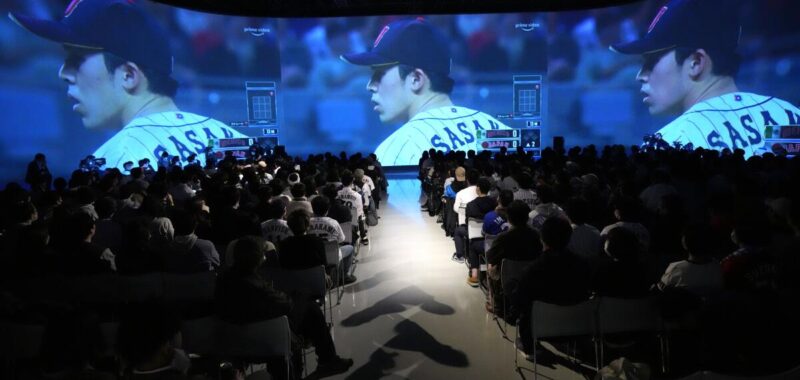Roki Sasaki already knows if he wants to pitch for the Dodgers.
This is purely speculation on my part, but based on what his agent said about him this week at baseball’s winter meetings, how could he not know?
The agent, Joel Wolfe of the Wasserman Media Group, described Sasaki as purposeful. As having a clear vision for his career. As being fiercely determined.
There’s no way Sasaki hasn’t already contemplated whether he wants to share a clubhouse with the greatest player ever to come out of his country — or perhaps any country. There’s no way the 23-year-old fireballer hasn’t thought about whether he wants to play with Shohei Ohtani or against him.
Speaking to reporters at the Hilton Anatole hotel, Wolfe recalled meeting Sasaki for the first time two winters ago. Wolfe was introduced to Sasaki by one of his clients, Yoshi Tsutsugo, who played briefly for the Dodgers.
“I could tell immediately he was determined to come to the U.S. and that he wanted to come early,” Wolfe said.
Sasaki was only 21 at the time.
Wolfe was struck by how Sasaki was prepared to deal with the consequences.
“He knew he was going to be subject to a lot of criticism in the media,” Wolfe said.
That wasn’t exactly how it played out. Last winter, when Sasaki made his initial push to force his way out of Japan, he came under scrutiny by the country’s notoriously aggressive weekly tabloid magazines but continued to receive favorable coverage from the mainstream daily sports newspapers.
The backlash he received mostly came from the public. Japan is a country that believes in order. Baseball players are expected to win championships and individual awards before graduating to the major leagues. Ohtani was a Pacific League most valuable player and Japan Series champion with the Nippon-Ham Fighters. Yoshinobu Yamamoto was a three-time Pacific League MVP and Japan Series champion with the Orix Buffaloes.
Sasaki hadn’t won anything. Who was he to ask the Marines to post him?
He transformed from hero to villain in his final season with the Marines. Virtually the entire country had supported him since he was in high school in large part because he lost his father in the tsunami that devastated Japan’s Tohoku region in 2011. A significant percentage of that support vanished overnight.
Whatever the details, Wolfe’s larger point about Sasaki’s acceptance of the fallout holds true. Sasaki knew that attempting to expedite his dream of playing in the major leagues would cost him an enormous amount of public goodwill. He didn’t let that stop him.
“I have an incredible amount of respect for Roki and his family for putting themselves in that position of great difficulty because they were greatly criticized, as you all know, because of the position that he took,” Wolfe said. “He never backed down. He never deviated from what he wanted. He just got stronger inside and more determined and never gave up.”
Sasaki is classified as an international amateur player and can only sign a standard minor-league contract. By waiting two more years, he could have hit the market as an unrestricted free agent, which likely would have resulted in a nine-figure contract for him and an eight-figure cashout for the Marines. Wolfe emphasized that he didn’t convince Sasaki to move to the majors now.
“Nobody convinces Roki of anything,” Wolfe said. “Roki convinces us. He runs his own ship. He’s the boss.”
There are obvious similarities between the stories of Sasaki and Ohtani, who are both from the northern Japanese prefecture of Iwate. Ohtani was widely accused of disrespecting professional baseball when he said he signed with the Fighters and said he intended to be a two-way player. Even after successfully pitching and hitting in Japan, not everyone was convinced he could continue doing so in the major leagues. In retrospect, it was obvious why Ohtani decided to initially sign with the Angels. He was looking for a team that wouldn’t stand in the way of what he wanted.
Sasaki almost certainly has as clear a plan for his career. What that is remains a mystery because Sasaki is a mystery. The Marines went to extreme lengths to shield Sasaki from the media in his five years with them, so much so that the intensely private Ohtani seems like an open book by comparison.
Wolfe said he wasn’t “entirely sure” what Sasaki was looking for in his next team. About the only clue Sasaki has provided about what he wants was in a statement he released through the Marines last month when they announced he would be posted.
“I’ll do my best so I can become the No. 1 player in the world,” Sasaki said.
But what does that look like in Sasaki’s mind?
Could Sasaki obtain the stature he desires if he’s pitching on a team led by Ohtani? Or does he think he has to beat Ohtani by joining a rival team such as the San Diego Padres or New York Yankees?
Would his injury history make him more inclined to join a Dodgers team with plenty of pitching depth that could limit the number of innings he throws? Or does he want the responsibility of being a staff ace from the start?
Does he want to enhance the legacy of a signature franchise? Or does he want to transform an underachieving team as Ohtani tried to do with the Angels?
The Dodgers are preparing to make a presentation to Sasaki, as they should. Due diligence is important. But in reality, there probably isn’t much they can say to him to change his mind. He’s been planning this move for years.

